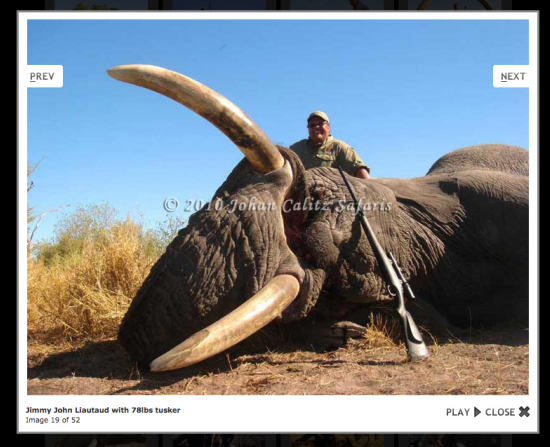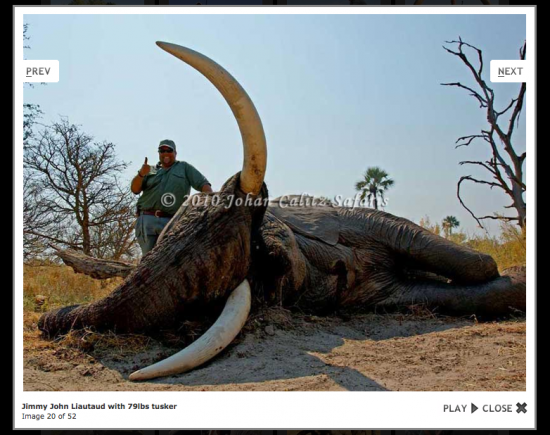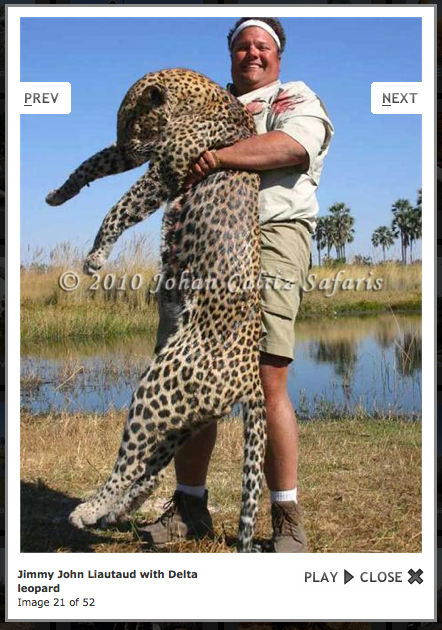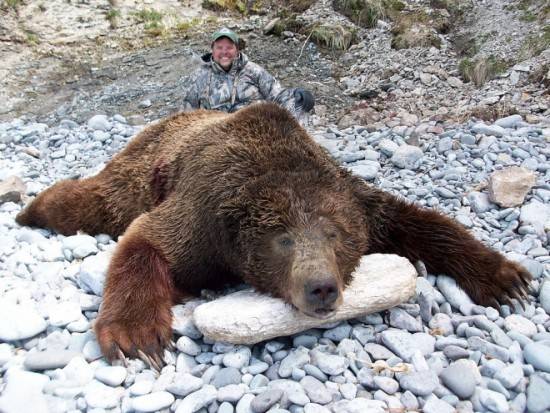Oh, were you expecting a Weiner story?
No, for now tales of Jimmy John’s violent exploits are limited to using his (tax-dwindled) funds to live out fantasies of stalking, predation, and slaughter in exotic locales.
Jimmy, I’ll finance your next trip if you think you’re man enough to do it bare-handed.



p.s. Your sandwiches are shit.
——-
An update based on my thoughts in communicating with a few commenters:
Thank you to all who have read, forwarded, and provided insightful commentary or information-and this would include an invitation to and preemptive thanks for anyone who can provide a legitimate defense beyond, “Who cares?” I think it’s immediately apparent that a lot of people care.
Also, a special tip of the hat to Jonathon Childers, who alerted SP to these photos.
I fully appreciate skepticism and the withholding of support for the targeting and criticism of another human until reason and sense dictate otherwise. I believe the photos do dictate such responses, though context and additional information are always warranted.
I could have written a longer, investigative piece, and tied in trophy hunting with the ills of our civilization, but I chose not to. Positive and negative consequences follow. One of the positives is that, in deferring from framing the discussion analytically, readers have felt inclined to weigh in on important subjects like economic models, animal cruelty, debased human behavior abroad and on-site (if I want to feel apocalyptic I go read internet comment threads), and the need to find constructive solutions.
I believe we’re collectively culpable, and pointing out the varying degrees of hypocrisy in order to maintain the status quo is a fool’s errand at best and slyly evil at worst. After all, you may eat tofu harvested from mono-crop fields and ride your bike to work on the streets — thus mitigating your footprint, but still acting as an accessory to a few of the prongs of civilization that have destroyed animal habitat – the primary cause of species decline in the first world. Such complicity is, in fact, real. However, I don’t think this relative complicity should prevent one from speaking out about human behavior — though that is a recurring theme in the comments, and surely will be pushed by Jimmy John’s PR department. Collective culpability and relative hypocrisy do not mean that any behavior is sanctioned, or that we are incapable of making value judgements on grossly immoral acts.
I eat meat. I don’t have a moral problem with that (partially because I firmly believe in the rightness of big predators like leopards and wolves). But I eat more than I should, and I’m not always careful about where it comes from. I do have a problem with that. If these pictures lead to greater discussion of how humans fit in to the larger landscape, I will be happy.
Best.
——
Saturday June 11, 2011, 3:10 AM
I wonder if some people have looked around lately. “Tabloid journalism” has lost any sense of meaning or proportion. Call this whatever you like, but I’m willing to go on record here because I think these photos represent a piece of humanity which is a danger to civilization.
It was not the man’s physical girth that I was referring to in the title, but rather the aggrandized sense of his self-importance. This is not charismatic confidence displayed among the bounty that he had the drive to create and the fortune to be born into (that is, simply by being born into this abundant and elegant existence), but a twisted conception of his place and role in the world.
Oh, and there was A. Weiner joke in there.
A title referencing “manhood” would have been more accurate of my intentions. I wasn’t even considering his weight, a topic which, although it lends itself to crude anonymous comments, isn’t entirely removed from the purview of the discussion—both of these being reasons why the subject would have been broached regardless of an ambiguous title remarking on size.
Full disclosure, along with a referral to the discussion of relative culpability above:
I have the remains of a few species in my home. One of which I killed and the rest I acquired in non-commercial transactions. On the wall is a fair sized muskey that I reeled in when I was 8. I have no overriding moral qualms with hunting, eating, or otherwise benefitting from animals, but once we have brought these animals within the reach of civilization, we have a responsibility to care for their welfare. At the very least as species, and often on the individual level as well. If nothing else, this fish reminds me that I have no further need for hollow trophies.
To anyone that would argue that avoiding Jimmy John’s Gourmet Sandwiches actually hurts the *smaller* people—you’re correct. But I would respond that:
- Without substantive reason, I don’t have to care about the economic well-being of those who willingly got into business with Jimmy John. This is, at least in part, a freewheeling, occasionally carnivorous system where both ethical and logistical choices daily determine who succeeds and who fails. And I’m ok with that. I better be as that’s the reality of the earthly world that I’m extolling.
- If you’re a franchisee who has little notion of the victor to whom you are sending the spoils, I can understand that, If I’m somewhat disappointed by it. Ignorance is, in my opinion, substantive reason to give one pause in taking actions against these people. I didn’t know until a few days ago, which is an indictment all around. Could a franchisee stand up and say that he or she thinks this behavior should not be part of human activity without fear of reprisal? If so, then a modicum of respect all around, and cheers for giving us that information to use when we choose how to eat.
If I so choose, and often even when I do not, I can find daily outpourings from a different tribe, all saying that I am, along with my beliefs, a danger to civilization. If that is the way they feel, or even and especially if they are cynically manipulating others to actually feel it, then I have no choice but to believe the reciprocal may be true. I think it likely.
Where does that leave us?

———-
Monday June 13, 2011, 2:31 PM
I’m hard pressed to find an occasion when I was ever convinced by the reasoning, “We must kill them in order to save them.”
Some will argue that big game hunting finances greater conservation efforts, and when properly managed, can lead to an increase in the population of threatened species. A few people certainly are spending big bucks to kill them. Of course, you could drop a quarter of a million to simply save them, but that’s less fun.
Still, I can appreciate a reasoned defense on this issue (if I disagree with the underlying assumptions) as I am a supporter of hunting and fishing under certain circumstances. Geese and deer are (over)populous across a range of habitats as our land use practices have not been inimical to their species.
The same cannot be said for elephants, leopards and bears. That the bear population may be healthy on one island in Alaska does not make me feel differently. Jimmy John has chosen to kill an animal that is clinging to what little habitat remains for it. If the overall deer population was similarly threatened, I would reevaluate as necessary.
I think it is all the more important for people who support hunting and fishing, as I do, to step up and condemn this kind of hunting.
In America, we hold a few propositions to be self-evident, though that does not mean they should be without rational basis. I would include in this list some that are self-evidently untrue:
- that economic development at any cost is worth it, and
- that glorifying the killing of threatened animals could be a net benefit to the environment.
Also, even if the above were true, without significant evidence, I would not trust those handling the permitting and execution of these “conservation” projects. I have some familiarity with who recently staffed the Alaska Department of Fish and Game, and I do not believe they were unbiased by their other attachments, interests, and careers. I know less about Botswana, but I would again ask for transparency and clear evidence from this African nation that the dollar signs are not impeding the overall conservation effort, and that corruption has not breached the animal-killing industry.
I make no attempt to justify hypocrisy. I accept my own level of culpability in human impact to the landscape and its creatures. But I refuse the implication that, because we are all complicit at one level or another, it becomes impossible for us to speak out against any wrongdoing.
This is where I’ve chosen to draw the line. Others on either side, PETA-members or big-game trophy hunters, may disagree. You may disagree. But I firmly stand by my ability to draw that line, and I believe in the basis by which I do so.








